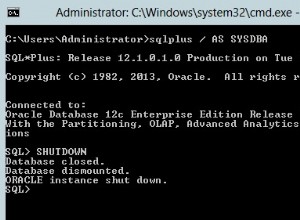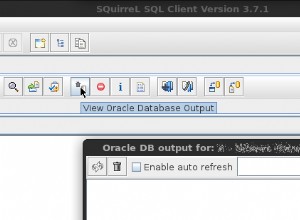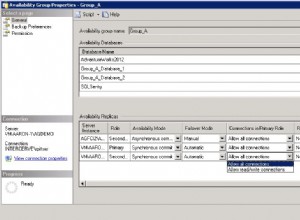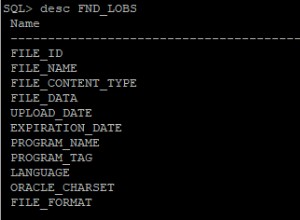Bem, depois de muita pesquisa e revisão de documentação conflitante, encontrei a resposta. Infelizmente não era o que eu procurava:
Resumindo, o Slick não suporta funções armazenadas ou procedimentos prontos para uso, então temos que escrever nossos próprios.
A resposta é sair do Slick pegando o objeto de sessão e, em seguida, usar o JDBC padrão para gerenciar a chamada do procedimento. Para aqueles que estão familiarizados com JDBC, isso não é uma alegria... mas, felizmente, com Scala podemos fazer alguns truques bem legais com correspondência de padrões que facilitam o trabalho.
O primeiro passo para mim foi montar uma API externa limpa. Foi assim que ficou:
val db = Database.forDataSource(DB.getDataSource)
var response: Option[GPInviteResponse] = None
db.withSession {
implicit session => {
val parameters = GPProcedureParameterSet(
GPOut(Types.INTEGER) ::
GPIn(Option(i.token), Types.VARCHAR) ::
GPIn(recipientAccountId, Types.INTEGER) ::
GPIn(Option(contactType), Types.INTEGER) ::
GPIn(contactValue, Types.VARCHAR) ::
GPIn(None, Types.INTEGER) ::
GPIn(Option(requestType), Types.CHAR) ::
GPOut(Types.INTEGER) ::
Nil
)
val result = execute(session.conn, GPProcedure.SendInvitation, parameters)
val rc = result.head.asInstanceOf[Int]
Logger(s"FUNC return code: $rc")
response = rc match {
case 0 => Option(GPInviteResponse(true, None, None))
case _ => Option(GPInviteResponse(false, None, Option(GPError.errorForCode(rc))))
}
}
}
db.close()
Aqui está um passo a passo rápido:Criei um contêiner simples para modelar uma chamada de procedimento armazenado. O GPProcedureParameterSet pode conter uma lista de instâncias GPIn, GPOut ou GPInOut. Cada um deles mapeia um valor para um tipo JDBC. O recipiente fica assim:
case class GPOut(parameterType: Int) extends GPProcedureParameter
object GPOut
case class GPIn(value: Option[Any], parameterType: Int) extends GPProcedureParameter
object GPIn
case class GPInOut(value: Option[Any], parameterType: Int) extends GPProcedureParameter
object GPInOut
case class GPProcedureParameterSet(parameters: List[GPProcedureParameter])
object GPProcedureParameterSet
object GPProcedure extends Enumeration {
type GPProcedure = Value
val SendInvitation = Value("{?=call app_glimpulse_invitation_pkg.n_send_invitation(?, ?, ?, ?, ?, ?, ?)}")
}
Para completar, estou incluindo a enumeração GPProcedure para que você possa juntar tudo.
Tudo isso é entregue ao meu
execute() função. É grande e nojento, cheira a JDBC antiquado, e tenho certeza que vou melhorar bastante o Scala. Eu literalmente terminei isso às 3 da manhã ontem à noite... mas funciona, e funciona muito bem. Observe que este execute() específico função retorna uma List contendo todos os parâmetros OUT... Vou ter que escrever um executeQuery() separado função para lidar com um procedimento que retorna um resultSet . (A diferença é trivial:você apenas escreve um loop que pega um resultSet.next e coloque tudo em uma List ou qualquer outra estrutura que você desejar). Aqui está o grande e desagradável Scala<->mapeamento JDBC
execute() função:def execute(connection: Connection, procedure: GPProcedure, ps: GPProcedureParameterSet) = {
val cs = connection.prepareCall(procedure.toString)
var index = 0
for (parameter <- ps.parameters) {
index = index + 1
parameter match {
// Handle any IN (or INOUT) types: If the optional value is None, set it to NULL, otherwise, map it according to
// the actual object value and type encoding:
case p: GPOut => cs.registerOutParameter(index, p.parameterType)
case GPIn(None, t) => cs.setNull(index, t)
case GPIn(v: Some[_], Types.NUMERIC | Types.DECIMAL) => cs.setBigDecimal(index, v.get.asInstanceOf[java.math.BigDecimal])
case GPIn(v: Some[_], Types.BIGINT) => cs.setLong(index, v.get.asInstanceOf[Long])
case GPIn(v: Some[_], Types.INTEGER) => cs.setInt(index, v.get.asInstanceOf[Int])
case GPIn(v: Some[_], Types.VARCHAR | Types.LONGVARCHAR) => cs.setString(index, v.get.asInstanceOf[String])
case GPIn(v: Some[_], Types.CHAR) => cs.setString(index, v.get.asInstanceOf[String].head.toString)
case GPInOut(None, t) => cs.setNull(index, t)
// Now handle all of the OUT (or INOUT) parameters, these we just need to set the return value type:
case GPInOut(v: Some[_], Types.NUMERIC) => {
cs.setBigDecimal(index, v.get.asInstanceOf[java.math.BigDecimal]); cs.registerOutParameter(index, Types.NUMERIC)
}
case GPInOut(v: Some[_], Types.DECIMAL) => {
cs.setBigDecimal(index, v.get.asInstanceOf[java.math.BigDecimal]); cs.registerOutParameter(index, Types.DECIMAL)
}
case GPInOut(v: Some[_], Types.BIGINT) => {
cs.setLong(index, v.get.asInstanceOf[Long]); cs.registerOutParameter(index, Types.BIGINT)
}
case GPInOut(v: Some[_], Types.INTEGER) => {
cs.setInt(index, v.get.asInstanceOf[Int]); cs.registerOutParameter(index, Types.INTEGER)
}
case GPInOut(v: Some[_], Types.VARCHAR) => {
cs.setString(index, v.get.asInstanceOf[String]); cs.registerOutParameter(index, Types.VARCHAR)
}
case GPInOut(v: Some[_], Types.LONGVARCHAR) => {
cs.setString(index, v.get.asInstanceOf[String]); cs.registerOutParameter(index, Types.LONGVARCHAR)
}
case GPInOut(v: Some[_], Types.CHAR) => {
cs.setString(index, v.get.asInstanceOf[String].head.toString); cs.registerOutParameter(index, Types.CHAR)
}
case _ => { Logger(s"Failed to match GPProcedureParameter in executeFunction (IN): index $index (${parameter.toString})") }
}
}
cs.execute()
// Now, step through each of the parameters, and get the corresponding result from the execute statement. If there is
// no result for the specified column (index), we'll basically end up getting a "nothing" back, which we strip out.
index = 0
val results: List[Any] = for (parameter <- ps.parameters) yield {
index = index + 1
parameter match {
case GPOut(Types.NUMERIC) | GPOut(Types.DECIMAL) => cs.getBigDecimal(index)
case GPOut(Types.BIGINT) => cs.getLong(index)
case GPOut(Types.INTEGER) => cs.getInt(index)
case GPOut(Types.VARCHAR | Types.LONGVARCHAR | Types.CHAR) => cs.getString(index)
case GPInOut(v: Some[_], Types.NUMERIC | Types.DECIMAL) => cs.getInt(index)
case GPInOut(v: Some[_], Types.BIGINT) => cs.getLong(index)
case GPInOut(v: Some[_], Types.INTEGER) => cs.getInt(index)
case GPInOut(v: Some[_], Types.VARCHAR | Types.LONGVARCHAR | Types.CHAR) => cs.getString(index)
case _ => {
Logger(s"Failed to match GPProcedureParameter in executeFunction (OUT): index $index (${parameter.toString})")
}
}
}
cs.close()
// Return the function return parameters (there should always be one, the caller will get a List with as many return
// parameters as we receive):
results.filter(_ != (()))
}




